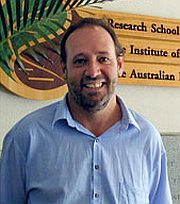|
|
|
|
|
|
|
News & Views item - October 2009 |
![]() Michael Roderick Awarded 2009
Australasian Science Prize for Climate Change
Research. (October 27, 2009)
Michael Roderick Awarded 2009
Australasian Science Prize for Climate Change
Research. (October 27, 2009)
The Australian scientist who overturned some "obvious" assumptions regarding climate change was today awarded the 2009 Australasian Science Prize.
 Dr
Michael Roderick “has raised questions of global significance”; he is a joint
Fellow in The Australian National University’s Research School of Earth Sciences
and Research School of Biology.
Dr
Michael Roderick “has raised questions of global significance”; he is a joint
Fellow in The Australian National University’s Research School of Earth Sciences
and Research School of Biology.
Dr Roderick’s research was based on a deceptively simple experiment that measures
the rates of water evaporation from about 300 standardised pans distributed
around Australia and more overseas. Counterintuitive the pans reveal that
although the world has been warming, evaporation has been declining. He explains
the paradoxical evidence: London receives about 600 mm of rainfall every
year, and the surrounding landscape is green and wet. On average, Canberra also
receives around 600 mm each year but the surrounding landscape is much drier and
largely brown. The landscape differences are largely due to the different rates
of evaporation. Evaporation is much higher in Canberra than London.
Needless to say, there has been a widespread expectation that evaporation would
increase as air temperature rises with global warming. It has been anticipated,
for example, that wet and green places like London would become more like
Canberra should global temperatures rise.
There was surprise amongst the global scientific community when confronted with
observations showing that the evaporation of water from pans has been, on
average, declining over the last 30–50 years just as global temperatures have
been rising. Understanding and unravelling the ‘pan evaporation paradox’
underpins the whole question of how water availability has changed and might
change.
Dr Roderick has shown that several factors are at work simultaneously, with
declining wind speed and/or declining radiation being the major
global factors behind declining evaporation.
However, Dr Roderick’s research has been published since the mid-2006 cut-off
date for the Intergovernmental Panel on Climate Change’s Fourth Report (2007)
and therefore updates the IPCC’s models, particularly in relation to rainfall
forecasts.
Earlier in the year Dr Roderick and PhD researcher Wee Ho Lim released the
Atlas of the Global Water Cycle. These maps, averaged from a number of the
IPCC’s climate models, show the history of rainfall in regions of Australia and
overseas and outline the best rainfall projections, with uncertainties stated.
A separate study of the water-stressed Murray–Darling Basin (MDB), released
exclusively with this announcement, finds “fundamental differences” between
public beliefs about climate change and scientific observations. The study by Dr
Roderick and Professor Graham Farquhar, a plant physiologist at the ANU, finds
that “the public perception is that it will get drier, whereas the scientific
basis is that it will rain more on a global average basis. When averaged across
all models, a robust prediction is for global precipitation to increase annually
by 17 mm for every 1°C of warming.”
The study finds that some regions will become wetter while others will become
drier. “We should not give up on agriculture and water resources in the MDB and
other once-productive regions,” Dr Roderick remarks. “The future is not
necessarily as bleak as appears from the recent and continuing drought.”
According to Dr Roger Gifford, Chief Research Scientist in CSIRO’s Plant
Industry: “Observations and conclusions like Dr Roderick’s will improve climate
change predictions and lead to more realistic assumptions about the nature of
human-induced climate change that sit behind a great deal of climate change
impacts and adaptation research. He is a scientist’s scientist.”
Dr Thomas Barlow, a research policy specialist, adds: “This is curiosity-led
science that has raised questions of global significance. He starts with very
simple but important questions and answers them with extraordinary rigour and
originality. In my mind this is truly inspirational stuff – science at its
best.”